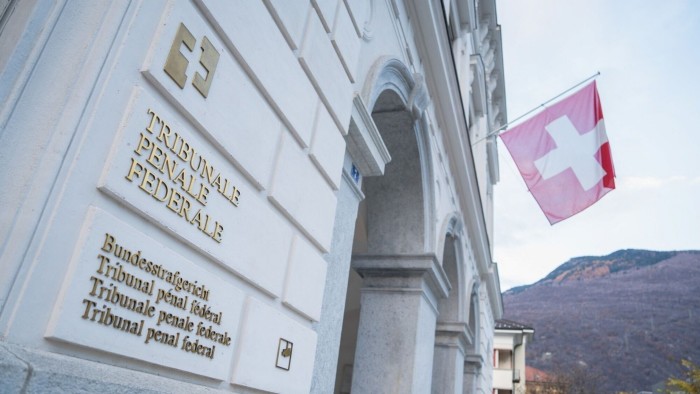Unlock the Editor’s Digest for free
Roula Khalaf, Editor of the FT, selects her favourite stories in this weekly newsletter.
Trafigura used dozens of “high risk” middlemen to smooth business deals in developing countries, the Swiss court trying the company for bribery heard on Friday.
The company reached a “tipping point” in 2019 when concerns over corruption outweighed the commercial benefits of such “intermediaries”, Michael Firth, Trafigura’s deputy head of compliance who has been in the department since 2010, told Swiss judges.
Many were set up by former Trafigura employees and were used to help the company unlock valuable trading opportunities in politically troubled or complicated countries, the court heard.
Trafigura’s compliance department had always considered the use of such arrangements to be “high risk”, Firth said. “There were concerns around bribery and corruption,” he said, when pressed by judges.
The commodity trading group is on trial at Switzerland’s federal criminal court this week in a case centred on its lucrative push into Angola between 2009 and 2011, in which a clutch of such intermediary contractors played a crucial role.
Switzerland has never put a commodity trader in the dock before. Trafigura, which runs much of its business from the country, is a giant of the global industry, with group revenues of $244bn last year.
The case is also the first worldwide where charges have been brought against a top executive from the sector: Mike Wainwright, who was Trafigura’s chief operating officer until April, is co-accused by Swiss prosecutors.
They allege the company paid more than €5mn of bribes through third parties to an Angolan government official in exchange for oil bunkerage and shipping contracts worth more than $143.7mn in profits.
Lawyers for Trafigura have argued there is no evidence to connect the company or Wainwright to the decision to pay the alleged bribes. They have raised questions about the reliability of the prosecution’s evidence — and the fact that key figures in the alleged bribery chain have not been indicted or summoned as witnesses.
The trial has pored over contracts and payments between DT Trading, Trafigura’s jointly owned African subsidiary run by Mariano Ferraz, nicknamed “Mr Angola”; Consultco, an intermediary run by a former Trafigura trader Thierry Plojoux; and Wyland, an offshore corporate shell, the legal beneficiary of which prosecutors allege was the Angolan government official Paulo Gouveia Junior.
Trafigura’s lawyers are seeking to demonstrate that the company had robust compliance mechanisms in place at the time and did all it was required to prevent illegal payments from occurring.
They do not dispute that money may have been paid to Wyland by Consultco, which was their key intermediary in Angola, but say Trafigura had no knowledge of such payments being made.
Trafigura’s former chief financial officer Pierre Lorinet told the court on Thursday that payments from DT Trading to Consultco had not raised any “red flags”.
Firth told judges that Trafigura had about 50 such intermediary arrangements worldwide in 2010. In his experience, he said, they were rigorously scrutinised with “enhanced” compliance checks.
“We were aware that the bribery and corruption risk in Angola was high,” he said.
Over time the legal and reputational risks of using such middlemen grew, he said.
“I believe there came a tipping point, where the intermediaries were viewed as high risk, and meanwhile Trafigura was by then quite well established in the countries [they operated in] so there wasn’t the same need for them.”
Trafigura’s focus on compliance was constantly increasing over the period he worked for the company, Firth said. After 2011, the company went from performing repeat due diligence checks on key counterparties deemed high risk every three years to every year, he added.
Giving evidence to the court earlier in the week, Wainwright said he did not believe any of Trafigura’s intermediaries to have acted corruptly in his experience.
The decision to cut relationships with them, he said, was mainly due to pressure from banks lending Trafigura money.
The trial continues next week.



